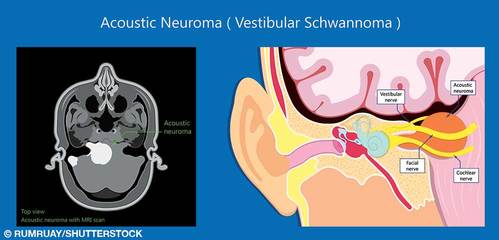Acoustic Neuroma

I had an acoustic neuroma excision 20 years ago. As an active snorkeler I am well aware of barotrauma risks, and fortunately I have no problem equalising my middle ear since the Eustachian tube is functional on that side. I am deaf in that ear, however, and understand the risk of hearing loss on my good side. Are there any dive-related risks besides hearing loss?
A: Acoustic neuromas are distinctive and usually benign growths of cells of the eighth cranial nerve. Essentially a brain tumor that develops within the adjacent structures of the brain, it grows into a round mass on the nerve where it emerges from the acoustic canal. Although some acoustic neuromas may produce noticeable symptoms, many are undetected until their growth begins to affect the brain stem and produce symptoms of partial or complete nerve deafness. Their advanced growth tends to affect the fifth and seventh cranial nerves and cause cerebellar ataxia and ultimately brain stem dysfunction. Fortunately, micro-surgical techniques offer good results and can generally preserve the seventh cranial nerve and occasionally the patient's hearing.
When considering diving, there are several issues to address: preexisting partial deafness and the risk of complete hearing loss due to barotrauma, physical or functional impairments that may interfere with the ability to respond to an emergency, and the difficulty for a physician to diagnose possible decompression illness. Patients are at risk for cerebrospinal fluid leaks, a relatively common complication that even without diving can produce symptoms of nausea and vomiting, neck stiffness and a sense of imbalance. In addition to unilateral hearing loss, they almost certainly cause disabling symptoms of unilateral vestibular loss (e.g., persistent dizziness, gait disturbances and imbalance). Additionally, temperature changes encountered during a dive (not necessarily thermoclines) may induce a caloric response of disabling vertigo as well as nausea and vomiting due to asymmetrical vestibular stimulation. In general, physicians trained in dive medicine recommend that patients avoid diving after acoustic neuroma surgery, regardless of the surgical approach.
— Daniel A. Nord, EMT-P, CHT
© Alert Diver — Q2 2020
A: Acoustic neuromas are distinctive and usually benign growths of cells of the eighth cranial nerve. Essentially a brain tumor that develops within the adjacent structures of the brain, it grows into a round mass on the nerve where it emerges from the acoustic canal. Although some acoustic neuromas may produce noticeable symptoms, many are undetected until their growth begins to affect the brain stem and produce symptoms of partial or complete nerve deafness. Their advanced growth tends to affect the fifth and seventh cranial nerves and cause cerebellar ataxia and ultimately brain stem dysfunction. Fortunately, micro-surgical techniques offer good results and can generally preserve the seventh cranial nerve and occasionally the patient's hearing.
When considering diving, there are several issues to address: preexisting partial deafness and the risk of complete hearing loss due to barotrauma, physical or functional impairments that may interfere with the ability to respond to an emergency, and the difficulty for a physician to diagnose possible decompression illness. Patients are at risk for cerebrospinal fluid leaks, a relatively common complication that even without diving can produce symptoms of nausea and vomiting, neck stiffness and a sense of imbalance. In addition to unilateral hearing loss, they almost certainly cause disabling symptoms of unilateral vestibular loss (e.g., persistent dizziness, gait disturbances and imbalance). Additionally, temperature changes encountered during a dive (not necessarily thermoclines) may induce a caloric response of disabling vertigo as well as nausea and vomiting due to asymmetrical vestibular stimulation. In general, physicians trained in dive medicine recommend that patients avoid diving after acoustic neuroma surgery, regardless of the surgical approach.
— Daniel A. Nord, EMT-P, CHT
© Alert Diver — Q2 2020
Posted in Alert Diver Spring Editions, Dive Safety FAQ
Posted in acoustic neuroma excision, Barotrauma, equalising, cerebrospinal fluid
Posted in acoustic neuroma excision, Barotrauma, equalising, cerebrospinal fluid
Categories
2025
2024
February
March
April
May
October
My name is Rosanne… DAN was there for me?My name is Pam… DAN was there for me?My name is Nadia… DAN was there for me?My name is Morgan… DAN was there for me?My name is Mark… DAN was there for me?My name is Julika… DAN was there for me?My name is James Lewis… DAN was there for me?My name is Jack… DAN was there for me?My name is Mrs. Du Toit… DAN was there for me?My name is Sean… DAN was there for me?My name is Clayton… DAN was there for me?My name is Claire… DAN was there for me?My name is Lauren… DAN was there for me?My name is Amos… DAN was there for me?My name is Kelly… DAN was there for me?Get to Know DAN Instructor: Mauro JijeGet to know DAN Instructor: Sinda da GraçaGet to know DAN Instructor: JP BarnardGet to know DAN instructor: Gregory DriesselGet to know DAN instructor Trainer: Christo van JaarsveldGet to Know DAN Instructor: Beto Vambiane
November
Get to know DAN Instructor: Dylan BowlesGet to know DAN instructor: Ryan CapazorioGet to know DAN Instructor: Tyrone LubbeGet to know DAN Instructor: Caitlyn MonahanScience Saves SharksSafety AngelsDiving Anilao with Adam SokolskiUnderstanding Dive Equipment RegulationsDiving With A PFOUnderwater NavigationFinding My PassionDiving Deep with DSLRDebunking Freediving MythsImmersion Pulmonary OedemaSwimmer's EarMEMBER PROFILE: RAY DALIOAdventure Auntie: Yvette OosthuizenClean Our OceansWhat to Look for in a Dive Boat
2023
January
March
Terrific Freedive ModeKaboom!....The Big Oxygen Safety IssueScuba Nudi ClothingThe Benefits of Being BaldDive into Freedive InstructionCape Marine Research and Diver DevelopmentThe Inhaca Ocean Alliance.“LIGHTS, Film, Action!”Demo DiversSpecial Forces DiverWhat Dive Computers Don\'t Know | PART 2Toughing It Out Is Dangerous
April
